Magdeburg/Sülzetal, Germany:
An Editorial Profile
An Editorial Profile
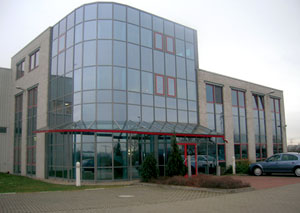 |
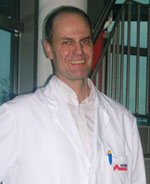 Dr. Thomas Langweider manages Human GmbH, a medical diagnostic kit producer, on a site being developed by KGE Kommunalgrund GmbH near the Port of Magdeburg. Dr. Thomas Langweider manages Human GmbH, a medical diagnostic kit producer, on a site being developed by KGE Kommunalgrund GmbH near the Port of Magdeburg. |
An Industrial Park
Takes Shape
Takes Shape
On the opposite side of town, tenants are moving into a 300- hectare (741- acre) site called Rothensee near the Port of Magdeburg that KGE Kommunalgrund GmbH is developing under a contract with the City of Magdeburg. (Such arrangements bring more financial resources to bear on the development than would be available from a municipality developing the area on its own.) Here, too, labor supply is an area asset, not liability – even in the life science arena. Wiesbaden- based Human GmbH recently opened a production facility at the site, where it makes a range of medical diagnostic kits for hospitals, clinics, labs and medical offices.
"Our employees are educated enough, the city authorities made the permitting process smooth, and access to the two main motorways are the main reasons behind this location," says Dr. Thomas Langweider, head of manufacturing at the facility. While he may not be able to hire all of his employees locally, Langweider says the same would be true almost anywhere else in eastern Germany, and the issue has not yet posed a major problem.
Shipping Human's finished products to end- users might be slightly problematic if those products were any more time sensitive. As it is, customers tend to keep a supply of test kits on hand and simply order more when the supply begins to run low. None of the area airports – in Berlin, Liepzig and Hannover – are particularly strong in terms of international service relative to Frankfurt, so trucking arrangements are in place linking the Magdeburg
|
On the academic side, Human conducts the bulk of its research and development in- house, but it does collaborate with the local branch of the Max Planck Institute and the University of Magdeburg on occasion.
Langweider says he would welcome additional companies in his field to the area. But for that to happen, people will need to shed their pre- reunification notions of the city as the machinery manufacturing engine for markets east of the Iron Curtain. Such notions are anachronistic, he says, and investors would be impressed by the industriousness of the area's workers today.
"On the production lines, the employees think like they are owners, making suggestions to improve different processes," he relates. "I never saw this in Berlin or in Vienna when I worked in those places."
Other companies located at KGE's Rothensee site include Schuberth Head Production Technology, which makes safety helmets for sports and industrial uses; Dascher, a logistics operation; and windmill- blade manufacturer Enercon GmbH; among others.
Magdeburg Artholith began construction in 2006 on a facility on a 10- hectare (24- acre) parcel for manufacturing artificial stone used in building fašades. Even before opening for production, the plant has contracts for producing products for customers in the United States and the United Arab Emirates that will provide a year's worth of work – at three shifts per day.
The facility will take advantage of the region's sandy soil, which is a key ingredient in the production of Artholith's building materials. Three glass plants in the area, including e-glass AG's new, US$157- million raw float- glass plant in Sülzetal- Osterweddingen, also benefit from the sandy soil composition. Flat glass is used extensively in the automotive and building construction industries. In April 2004, the European Commission authorized financial aid of 35 percent of eligible investment costs, given the facility's location in an assisted area or economic zone.
Other factors in the selection of the Rothensee site include its logistics infrastructure, meaning access to the two autobahn motorways and the nearby port; and a supply of skilled labor that is a third less expensive than elsewhere in Germany. The project will create 105 new jobs and two to three times as many related jobs in the service sector.
In essence, KGE Kommunalgrund acts as a trust for the City of Magdeburg during development of the site. Once it is developed, the site will be handed over to the city along with the tenants' debt financing, which will provide a revenue stream for the city.
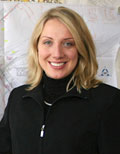 |
| Anna Wohlthat, KGE Kommunalgrund GmbH |
KGE first purchased land at the site from private owners and then put in place the legal structure for developing an industrial area. It then invested in the appropriate infrastructure needed to attract industrial tenants and is currently marketing space still available at the location. "We have an area of 100 hectares [247 acres] still available," says Wohlthat.
KGE facilitates the entire site selection, development and project management processes at Rothensee, eliminating hurdles an investor might otherwise encounter along the way. The services cost nothing to the investor.
"Our aim is to make investors' lives easier when they come here to invest, and that has been the case with all our investors," says Wohlthat.



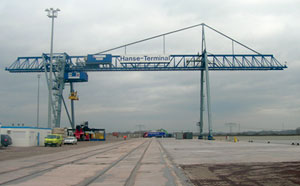
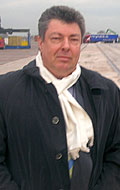 Port of Magdeburg Managing Director Karl- Heinz Ehrhardt is overseeing development of a new industrial zone that will give transshipment operators a logistics edge by being at a critical waterway intersection. A gantry crane capable of lifting 50 tons can reach ships, rail and trucks.
Port of Magdeburg Managing Director Karl- Heinz Ehrhardt is overseeing development of a new industrial zone that will give transshipment operators a logistics edge by being at a critical waterway intersection. A gantry crane capable of lifting 50 tons can reach ships, rail and trucks.